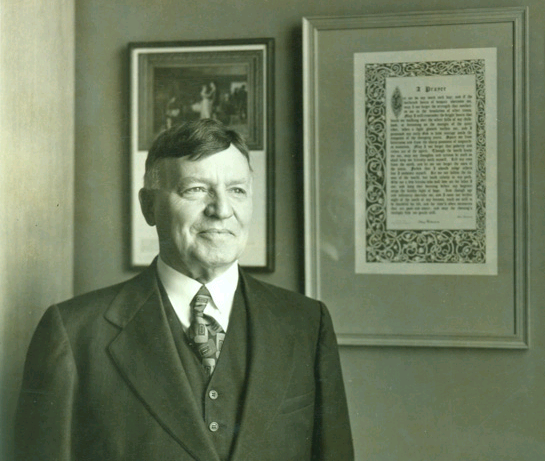“That I could sing a song that would soften the heart of the world!”
Max Ehrmann’s poems and prose, written in the early 1900s, ranged from laments of the human condition to uplifting, inspiring works. Ehrmann was a born philosopher, yet his view of the world was grounded in reality. After graduating from college, he practiced law and was Deputy Prosecuting Attorney for one term. He also worked as credit manager for his family’s overall factory in Terre Haute, Indiana.
 This man’s writing career spanned several decades. Whether he was writing a poem, prose or a play, he encouraged his readers to open their hearts to love and to lend a hand to others to lighten their burdens, a sentiment still valid today.
This man’s writing career spanned several decades. Whether he was writing a poem, prose or a play, he encouraged his readers to open their hearts to love and to lend a hand to others to lighten their burdens, a sentiment still valid today.In 1903, he wrote in prose, “A Prayer.” The spiritual piece encouraged faith in times of despair and thankfulness for life. It was one of his most successful publications. A framed copy was included in the Indiana Building in the 1904 World’s Fair in St. Louis, Missouri and it was printed in the Congressional Record in February 1909. “A Prayer” has been translated and set to music.
At age 40, Ehrmann “retired” to begin writing full time. In his 1922 journal, he wrote, “I would like, if I could, to leave to my country a bit of chaste prose that had caught up some noble moods. My life is spent in a time and among a people of commercial interest, with its attending selfishness, cruelty, and ostentation. I would reclaim a little of the heart of man, infuse some gentleness into the stern ethic of trade, and make life the supreme art instead of acquisition.”
One of my favorite poems, the 1927 “Desiderata” is Ehrmann’s most well-known. The word desiderata is Latin for “things desired as essential.” The poem was used on a variety of art posters starting in the 1960s, one of which hung on my bedroom wall. The posters are still popular today. They espouse his belief that “With all its sham, drudgery, and broken dreams, it is still a beautiful world. Be cheerful. Strive to be happy.”
This work was written when Ehrmann was 55 years old, nearly 15 years after his official “retirement.”
Look up more about Ehrmann and his work online, and remember that some of our best work happens after we turn 50!







Leave A Comment
You must be logged in to post a comment.